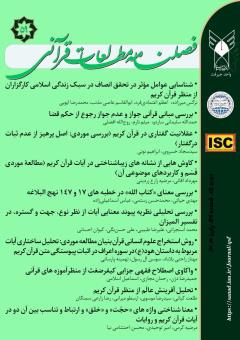عقلانیت گفتاری در قرآن کریم (بررسی موردی: اصل پرهیز از عدم ثبات درگفتار)
محورهای موضوعی : فصلنامه مطالعات قرآنی
سید سجاد خسروی
1
![]() ,
ابراهیم نوئی
2
,
ابراهیم نوئی
2
1 - دانشجوی دکتری شهید بهشتی تهران
2 - عضو هیات علمی دانشگاه شهید بهشتی تهران
کلید واژه: ثبات در گفتار, قرآن, عقلانیت گفتاری, عقلانیت,
چکیده مقاله :
هدایت انسانها یکی از مهمترین اهداف نزول قرآن کریم است و خداوند بنا دارد در قالب الفاظ گفتاری آن را آشکارسازد. ازسوی دیگر انسانها به عنوان مخاطب این گفتارها، خود را تنها ملتزم به پذیرش سخنانی می دانند که گویندۀ آنها، خود را ملتزم به رعایت اصولی کرده باشد که به اصول عقلانیت درگفتار شناخته می شوند.یکی از این اصول پرهیز گوینده از عدم ثبات درگفتار است.انسان ها همچنانکه سعی می کنند گفتار خودشان تزلزل نداشته و به گونه ای نباشد که پیوسته با گفتاری جدید سخنان قبلی خود را باطل کنند، همچنین سخن کسی را که واجد این ثبات درگفتار نیست فاقدعقلانیت می دانند و پذیرش آن را امری موجّه نمی دانند وبالتبع از آن سخن انتظار ارشاد وهدایت هم ندارند. برخی از مستشرقان با التفات به آیات نسخ درقرآن چنین پنداشته اند که قرآن به این اصل پایبند نبوده است. آنان برای این مدعا شواهدی را از آیات قرآن ذکر می کنند؛ این در حالی است که مسلمانان قرآن را کلام الهی میدانند و معتقدند گفتار قرآنی اصل مزبور را رعایت کرده است. این پژوهش که با مطالعه کتابخانه ای و تحلیل در آثار قرآن پژوهان مستشرق و مسلمان نگارش یافته به این نتیجه رسیده است که غالب شبهات مستشرقان به دلیل اینکه به علوم قرآنی مسلط نبوده اند رخ داده و برخلاف پندار آنها نسخ در قرآن کثرت نداشته و وجود همین موارد معدود نسخ در قرآن در طول نزول 23 ساله آن در راستای هدایت انسان ها بوده و امری معقول و مقتضای زمان بوده است.
Guiding people is one of the most important goals of the revelation of the Holy Quran, and God intends to reveal it in the form of spoken words. On the other hand, people, as the audience of these speeches, consider themselves only bound to accept the words whose speaker has committed himself to observe the principles known as the principles of rationality in speech. One of these principles is the speaker's avoidance of instability in speech. Just as people try not to waver in their speech and not to invalidate their previous speech with new speech, they also consider the speech of someone who does not have this stability in speech as lacking in rationality and do not consider it justified to accept it. Consequently, they do not expect guidance from that word. Some Orientalists have thought that the Qur'an did not adhere to this principle by referring to the abrogation verses in the Qur'an. This research, which was written through a library study and analysis of the Quranic works of Orientalist and Muslim scholars, has come to the conclusion that most of the doubts of the Orientalists occurred because they were not familiar with the Quranic sciences, and contrary to their belief, there were not many abrogations in the Quran and the existence of this The few cases of abrogation in the Qur'an during its 23-year revelation were in line with the guidance of humans and were reasonable and appropriate for the times.


